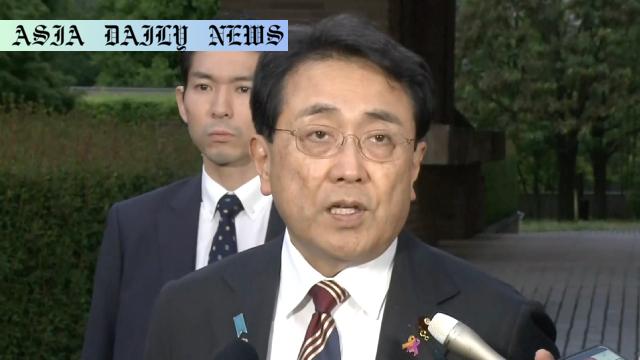Tariff Negotiations start with Japan seeking economic relief as auto sector suffers losses.

Introduction to the Tariff Negotiations
Japan is currently striving to address economic challenges posed by US tariffs on its exports. The country’s Economic Revitalization Minister, Akazawa Ryosei, has been at the forefront of these efforts, marking his fifth trip to Washington for in-depth tariff negotiations. These discussions come at a time when the Japanese auto industry, a cornerstone of the nation’s economy, is grappling with severe financial setbacks.
The Japanese government sees these talks as an urgent priority, striving to resolve a trade situation that has affected industries and economic stability alike. Minister Akazawa has emphasized his commitment to reaching an equitable resolution, with a strategy that balances timely action and careful considerations of national interest. The United States remains a key trading partner, and these talks reflect the importance of maintaining a constructive relationship amidst economic tensions.
Impacts on Japan’s Economy
The Japanese auto sector has been heavily impacted by the tariffs imposed by the US administration, reflecting the broader trade tensions between the two nations. Automobiles represent a significant portion of Japan’s exports, and any disruption in this sector reverberates across various aspects of the country’s economy, including employment rates and industrial growth. With delays in reaching a resolution, the Japanese government is facing increasing pressure to expedite the negotiation process.
Affected stakeholders within Japan, including policymakers, businesses, and trade organizations, have voiced concerns over prolonged uncertainty. Economic analysts suggest that the tariffs could lead to long-term challenges for Japan’s global competitiveness if left unresolved. Minister Akazawa’s approach of engaging closely with US counterparts highlights the urgency of these negotiations as a key diplomatic and economic initiative.
Upcoming G7 Summit as a Milestone
The Japanese government aims to finalize an agreement with its US counterparts before the Group of Seven (G7) Summit in Canada. The event, scheduled for mid-June, presents a significant platform for both nations to showcase a resolution to the ongoing dispute. Although a senior Japanese foreign ministry official has clarified that the summit is not a strict deadline, it is regarded as a critical milestone in these discussions.
Minister Akazawa’s stated intention to “make haste slowly” signifies a balanced approach, ensuring that outcomes are firmly aligned with Japan’s national interests while striving to meet immediate economic needs. With highly collaborative efforts underway, both countries are exploring the possibility of trade-offs and mutually beneficial agreements that could reset the bilateral economic relationship.
Strategies for Negotiation
Japan’s negotiating strategy revolves around demonstrating the adverse economic impacts of the tariffs while emphasizing the broader benefits of a strong economic partnership. The country has undertaken in-depth economic assessments to substantiate its claims, which will likely play a significant role during ministerial discussions. Ensuring that Japan’s economic priorities are safeguarded remains a cornerstone of these negotiations.
The ability to align mutual economic objectives while addressing contentious issues represents a significant challenge for the negotiators. Nonetheless, the proactive stance of both Japan and the US reflects their willingness to engage constructively, pointing to the possibility of substantial progress in the coming weeks.
Conclusion
At a time when economic tensions between global powers are shaping the economic landscape, the tariff negotiations between Japan and the US offer an insightful case study on the intricacies of modern trade diplomacy. By focusing on timely and mutually beneficial resolutions, both nations stand to gain significantly from a resetting of trade terms, potentially ushering in a period of economic growth and stability.
Commentary
Importance of Timely Resolution
The ongoing tariff negotiations between Japan and the US underscore the importance of finding timely resolutions in global trade disputes. Trade tensions of this magnitude not only test the resilience of national economies but also highlight the interconnected nature of global markets. For Japan, with its heavily export-driven economy, addressing these disputes swiftly is paramount to ensuring economic continuity and stability.
What stands out in this case is Japan’s proactive approach to the negotiations. Minister Akazawa’s multiple trips to Washington reflect a strong commitment to resolving the issue diplomatically. It is refreshing to see a government prioritizing multilateral engagement and constructive dialogue, especially during an era when protectionist policies have become increasingly common.
The Role of Collaboration in Trade
The Japan-US tariff discussions also serve as a reminder of the importance of collaboration in fostering global economic growth. Despite the prevailing disagreements, both nations have demonstrated a willingness to engage and find common ground. This collaborative spirit is essential for addressing not just bilateral disputes but also broader issues such as supply chain disruptions and systemic economic challenges.
By leveraging platforms like the G7 Summit, Japan and the US have an opportunity to showcase their commitment to global economic stability. Such efforts can send a positive message to other economies struggling with similar challenges, reinforcing the importance of multilateralism in resolving trade issues.
Final Thoughts
As the negotiations progress, it will be interesting to see how both nations balance their domestic priorities with broader economic objectives. The stakes are undeniably high, particularly for Japan, whose auto industry is heavily reliant on export markets. However, the ongoing discourse offers a silver lining, suggesting that even amidst economic uncertainties, diplomacy and engagement can pave the way for meaningful solutions.


